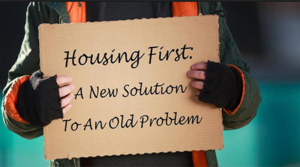Pima County launching innovative housing strategy for homelessness
 Pima County this month will begin testing a “Housing First” model in its approach to homelessness in the community. A two-year pilot project will provide housing for 150 individuals with the goal of improving their physical, mental and social well-being while also reducing criminal justice and healthcare system costs and strain.
Pima County this month will begin testing a “Housing First” model in its approach to homelessness in the community. A two-year pilot project will provide housing for 150 individuals with the goal of improving their physical, mental and social well-being while also reducing criminal justice and healthcare system costs and strain.
The County’s Criminal Justice Reform Unit will collaborate with Old Pueblo Community Services (OPCS) and Intermountain Centers to administer the program and provide medical and mental health assistance. To qualify for the program, participants must be currently homeless, have a substance use or a mental health issue and have been booked into the Pima County Adult jail at least twice in the previous 12 months. The housing will give the new residents privacy and dignity and as well as access to health and social services to help them achieve greater independence and self-sufficiency.
Pima County Administration committed $1.5 million annually to the effort.
“Rather than assuming drug addiction or mental health problems cause homelessness, housing first works from the opposite premise,” Director of Justice Reform Initiatives Terrance Cheung said. “This approach presumes that the stresses of homelessness exacerbate those issues and that by giving people a place to live and rest, we can give them a better chance to receive treatment than they would in a traditional shelter environment.”
The County partnered with the RAND Corporation, a nationally recognized organization with vast experience evaluating similar housing programs, and the Corporation for Supportive Housing to provide technical assistance.
“We want to collect good data and receive a sober and well-informed assessment of whether the Housing First approach works in Pima County,” Cheung said. “We want to know if it’s helping lower the jail population and easing demand of emergency health services. It also will help us partners for sustainable project funding moving forward.”
As many as 560 people would have met the program’s criteria in 2016.
Old Pueblo Community Services expects about 15 people at any one time will live in a residential property it owns in Tucson. Staff members trained in case management and recovery counseling will work on-site. A criminal justice advocate and outreach specialist will also assist clients with navigating the court process and finding social services, job and life-skills training and educational opportunities.
“It’s a great time to be doing this because everyone is aligned,” OPCS Chief Executive Officer Tom Litwicki said. “The County, the City of Tucson, the sheriff and police department, the fire department and the business community all agree this is something we should do and if we work together in this fashion we’ll actually see some progress.”
The City of Tucson contributed Housing Choice Vouchers that will cover the cost of housing 150 people.
“A Housing First approach has been highly successful in other communities, including Salt Lake City, Denver and Santa Clara County, California,” Program Manager Matt Pate said. “All of them saw a drop in their homeless population after implementing Housing First and an increase in the quality of life of people enrolled in the programs.”
Three Housing First clients already moved in to the OPCS complex. Others will be referred to the project by Pretrial Services and law enforcement until it reaches full capacity. Most clients will stay for between 45 and 90 days while staff members find them permanent